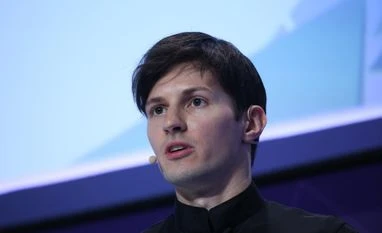Why Pavel Durov was arrested in France: Telegram scandal explained
France and Telegram are the latest examples of governments and tech companies clashing over online content regulation
)
Photo: Bloomberg
Pavel Durov, the founder of the popular messaging platform Telegram, was arrested upon arrival in France last Saturday (August 24), sparking international debate over the responsibility of tech platforms for illegal activities conducted through their services.
Durov, who landed in France on his private jet, was taken into custody by French authorities, who accused him of facilitating crimes committed on Telegram. The arrest is a significant move against one of the tech industry's most influential figures.
The following day, a French judge extended Durov's detention for up to 96 hours to allow further investigation.
Telegram denies allegations
Telegram has strongly denied the accusations against Durov. In a statement, the company said, "It is absurd to claim that a platform or its owner is responsible for abuse of that platform."
The case against Durov raises broader questions about the extent to which platform owners can be held accountable for the actions of their users.
Also Read
Who is Pavel Durov?
Pavel Durov, born in Russia in 1984, is a dual citizen of Russia and France. His career in the tech industry began with the creation of VKontakte, a social media site that remains popular in Russia. However, a disagreement with the site's new owners led to his departure in 2014.
Shortly before leaving VKontakte, Durov founded Telegram, a messaging platform known for its strong encryption and privacy features. These features have made Telegram a popular choice for those seeking to communicate securely, including activists in authoritarian countries. However, they have also made it a tool for criminals and extremist groups, complicating its reputation.
Durov’s connections with prominent tech figures like Elon Musk and Mark Zuckerberg, as well as his support within the libertarian tech community, have only added to his profile. Despite these ties, Telegram has faced legal challenges worldwide, including in Russia, where the platform has come under pressure to reveal user identities.
Why target Durov?
Durov’s arrest in France has raised questions about why he was singled out when other platforms, such as Meta’s WhatsApp and X, face similar issues. WhatsApp, with three times as many users, also offers encryption, and X has been criticised for its handling of hate speech and other problematic content.
Durov’s background may provide some clues. Unlike other major tech players, he does not hold US citizenship and hails from Russia, a country with a complex history of internet regulation and a deteriorating global standing due to the Russia-Ukraine War.
Additionally, while Telegram is a significant global player, it does not have the same resources as tech giants like Meta, making it a more accessible target for legal actions.
The debate on platform responsibility
Durov’s arrest is part of an ongoing global debate over how much responsibility tech platforms should bear for the content on their sites. Platforms like Telegram, WhatsApp, and those owned by Meta and X operate across multiple jurisdictions, each with different legal frameworks. This global reach complicates efforts to regulate them effectively.
On one side of the debate, there is a push to hold platforms accountable for illegal content or to require them to disclose the identities of users posting such content. For instance, Telegram has been pressured to reveal the identities of protesters using its platform to organise against Russia’s actions in Ukraine.
On the other hand, freedom of speech advocates argue against banning users from platforms, citing concerns over censorship. These conflicting pressures create a challenging environment for crafting effective regulation and enforcing it on a global scale.
Platforms like Google and Facebook have previously influenced public opinion by controlling content visibility, as seen during the debate over Australia’s News Media Bargaining Code. Such actions demonstrate the significant power these platforms wield over what information is seen by users.
As regulatory pressures mount, platforms may need to reconsider how they moderate content and manage user activity. European regulations, such as the Media Freedom Act and the Digital Services Act, aim to strike a balance by preventing arbitrary content bans while ensuring mechanisms are in place to remove illegal material. Australia’s Online Safety Act also seeks to protect users from harm, though its effectiveness remains under scrutiny.
Future implications
The outcome of Durov’s detention remains uncertain. Should he face charges and be prosecuted successfully, it could set a precedent for legal actions against other tech platforms and their leaders. Such a development could inspire similar investigations and actions in other countries, reshaping the global tech landscape.
This case may also prompt tech platforms to take a more proactive approach to monitoring and managing illegal content, balancing user privacy with the need to comply with legal obligations. As the world watches, the tech industry awaits the potential ripple effects of this high-profile arrest.
(With agency inputs)
More From This Section
Topics : Telegram hate speech Explained BS Web Reports
Don't miss the most important news and views of the day. Get them on our Telegram channel
First Published: Aug 27 2024 | 12:08 PM IST